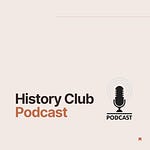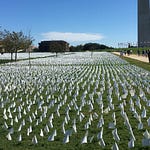Long-time subscribers will recall that in September 2021, I recorded a podcast episode live from New York City at an event called “Unfinished Live.”
At the time I knew little about Unfinished, the nonprofit entity hosting the event. But at the conference, which occurred on the far west side of Manhattan in a venue called “The Shed,” I got a glimpse into what they were building.
Unfinished was, then, a nascent community of practitioners and scholars interested in fixing what they termed a “broken” Internet. The very architecture of our digital world needed mending, the argument went, and Unfinished would take the lead in mending it. At the heart of the effort was an initiative called Project Liberty.
Fast-forward 2.5 years, and Unfinished has been fully rebranded into Project Liberty. Project Liberty seeks to build a new infrastructure for the Web where users are in control, not corporations. The crux of the new architecture is a protocol called DSNP, which stands for Distributed Social Networking Protocol. This new protocol envisions us connecting to each other through social networks that run on an open-sourced Internet not owned by companies such as Facebook or Google. Currently these companies use our data and interactions online to serve us ads and keep us hooked to our devices. Project Liberty, via DSNP, aims to give us a nearly identical social networking experience without the constant digital surveillance, removing the incentive to use our personal data as a commodity.
It’s a promising concept. Will it work in the real world? That remains a far more vexing question. Like any new product, the technical efforts are half the battle; the other half will be getting users to use the platform and stick with it. DSNP has been in development for several years, as has Project Liberty / Unfinished. Millions of dollars have been invested, with millions more committed.
That said, I’ve been impressed with Unfinished / Project Liberty since I first met the team back in 2021. I’ve been so impressed, my History Communication Institute has joined with more than 70 organizations that are part of the Project Liberty Alliance. Last year, we partnered with Project Liberty on an off-the-record briefing about artificial intelligence, and I was interviewed by Project Liberty / Unfinished in 2022 when my book, History, Disrupted, was released. The organization has been a great supporter of our efforts to make the Web and social media better places for accurate historical information.
So, when Project Liberty founder and benefactor Frank McCourt released his new book, Our Biggest Fight, it was only fitting for me to interview him. Frank used to own the Los Angeles Dodgers, a storied Major League Baseball franchise here in the U.S. He took some of the proceeds from his sale of the Dodgers and created the McCourt School of Public Policy at Georgetown University. (He talked a bit about that in our interview, including one revealing anecdote that inspired Project Liberty). We also talked about history, in particular Thomas Paine, who Frank has looked to for inspiration. I found Frank to be candid and heartfelt, and we had a very earnest conversation about the issues we are facing and the challenges to fix them.
Will Frank’s plan for a new Internet succeed? I encourage you to listen to our conversation and decide for yourself. After all, billionaires at the helm of social media companies led us into this messy and exploitative social networking world we now operate within in. Maybe a billionaire can help lead us out of it?
Enjoy the interview — and have a good week.
-JS









